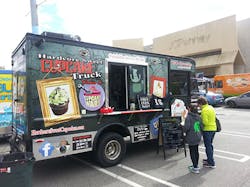Why we love food trucks
The editorial staff here at Fleet Owner writes about a wide variety of trucks and trailers, from over-the-road to off-road. But there are some segments of the trucking industry we just don’t spend much time on – one of those is food trucks.
Yes, I know what many of you are thinking. First off, they serve food. Secondly, the truck – or van in many cases – simply serves as a vehicle to serve food from. Again, it’s about the food.
But food trucks are everywhere these days, and as a result, more and more cities and towns are being forced to rewrite local ordinances to address this specialty vehicle. Pressure from local restaurants – and residents - who don’t want these mobile food vendors parking on their streets or taking away their business is increasing.
The tsunami of food truck mania has now hit nearly every city in this country and has spawned state associations in most states as well as a national organization, the National Food Truck Association, geared towards promoting the fine cuisine – and having tasted a sampling this weekend during a food truck festival held near my home at the Westfield Meriden (CT) mall – I can say, the cuisine is fine, really good and even great in some cases.
These are no longer your greasy hamburgers and hot dog vendors. Food trucks today ran the gamut from hot dogs to lobster, to ice cream and donuts, and even trucks that specialize in grilled cheese and baked potatoes. If you have a food craving, chances are there is a food truck ready to feed it.
In fact, according to a report from ABC News, luxury hotels are getting into the act. Four Seasons hotels are just one of the big hotel chains that have been sending food trucks out along the East Coast this fall, ABC says, in this report.
While perusing the trucks this weekend, I took a few photos – the lines were long at some of the trucks – and have put them together in the accompanying gallery along with some food truck facts, courtesy of the Institute for Justice’s National Street Vending Initiative called “Seven Myths and Realities About Food Trucks: Why the Facts Support Food-Truck Freedom.”
Here are some of the food truck facts, according to the Initiative:
- As of November 2012, the New York Food Truck Association had 42 members with 40% of those members also owning restaurants.
- Among the disadvantages the National Street Vending Initiative pointed out is the mobility. Without permanent places to park, it can be difficult for customers to find a food truck on a regular basis. The trucks also see sales drop when the weather turns rainy or snowy.
- Because many cities do not have special parking rules for food trucks, they may be limited by 2-hour parking limits. With set up and clean up time, that can leave as little as one hour to serve customers in a given location.
- According to the National Street Vending Initiative, a new food truck can cost between $75,000 and $300,000 to purchase.
- Between food preparation, locating a parking space, perhaps relocating several times throughout the day to meet local regulations, serving customers and cleanup, a food truck operator’s day can easily extend to 17 hours.
- Food trucks must meet health and sanitary guidelines just like any restaurant, according to the National Street Vending Initiative, are inspected just as often.
If you can’t get out today to enjoy a food truck, I hope these photos can hold you over. Enjoy.
See the gallery here: http://fleetowner.com/equipment/food-truck-mania
